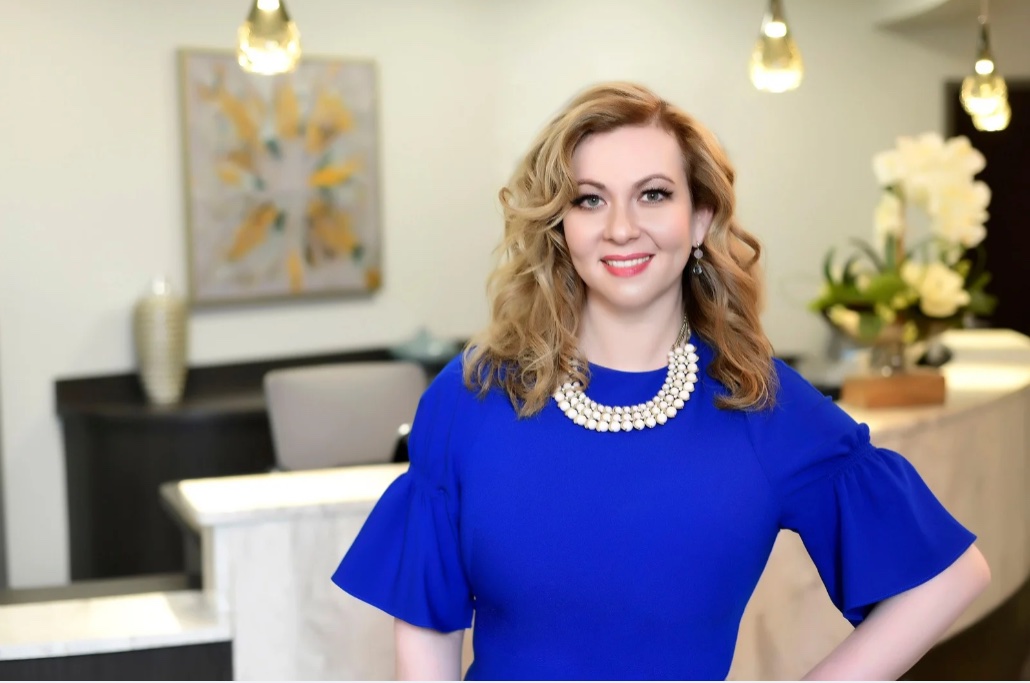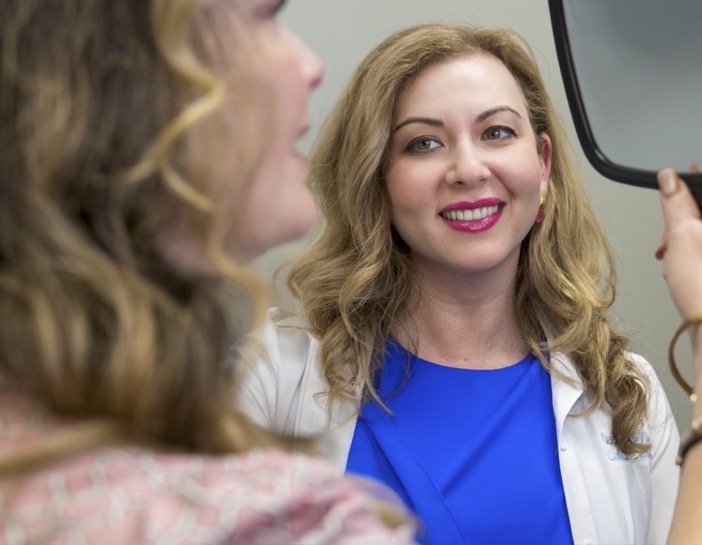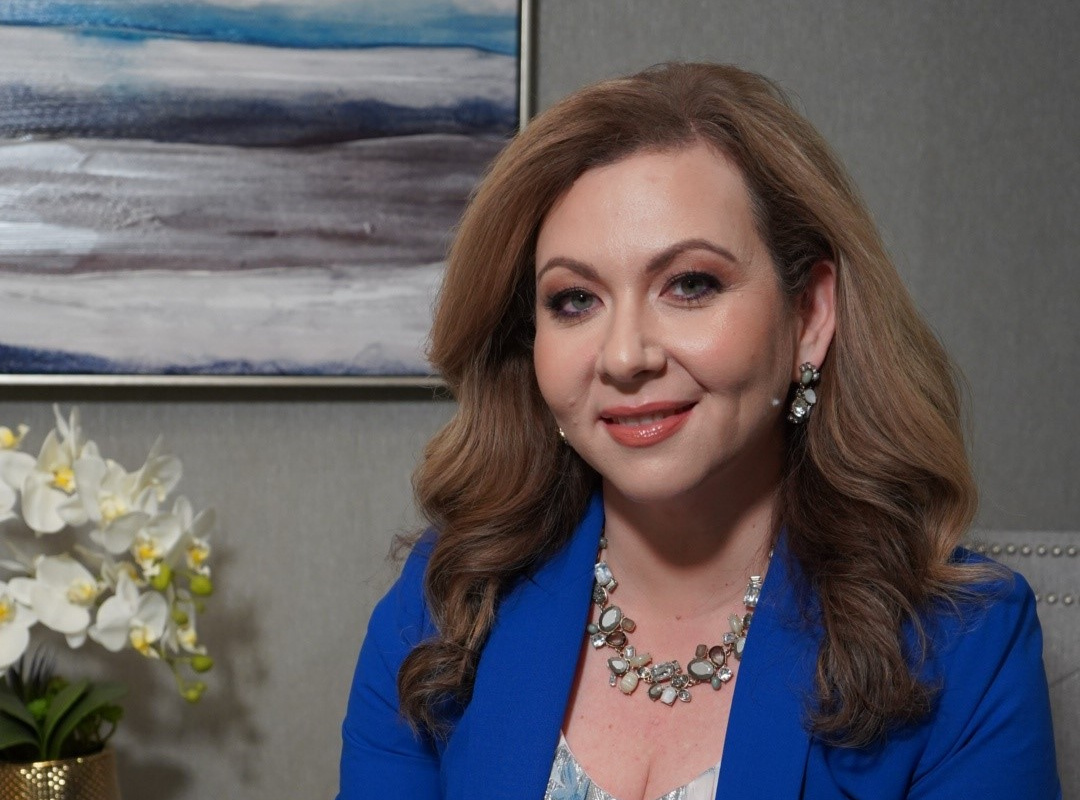When Dr. Vlada Groysman pivoted from oncology to dermatology, she found the perfect blend of science, art, and advocacy for women’s health. As founder and medical director of Cahaba Dermatology & Spa Skin Health Center, she treats adults and adolescents with medical, surgical, cosmetic, and laser care.
A former UAB educator, she’s also the ONLY vulvar dermatologist in the Southeast! We caught up with Dr. Groysman to hear about common skin conditions in women (yes, that includes vulvar conditions), her favorite places in Birmingham, and more.

What’s something you wish more women knew about their skin health?
I wish women knew how important sunscreen is in their teenage years. I think that all ethnicities, all ages, need to use sunscreen on a regular basis, but specifically when we’re younger. Right now, there is a lot of emphasis on exfoliators and hyaluronic acid moisturizers, and I don’t think any of it is truly necessary when you’re young.
The most important thing that any young girl could start using is sunscreen. We pay for everything we do when we’re young. So when you’re in your 40s, 50s, and 60s, you start dealing with side effects of sun exposure, including collagen loss, elastin loss, hyperpigmentation, melasma, and large pores. It seems like a cliché, but it’s actually super important.
What are some common conditions within vulvar dermatology?
There are several, but one of the common conditions is just regular dermatitis, which is like eczema of the vulva region. There’s psoriasis, there’s hidradenitis suppurativa, which looks like boils in the groin and buttocks area. And the most common conditions that I treat are lichen sclerosis, which is an autoimmune skin condition that causes scarring of the vulva region, as well as lichen planus, which is also an autoimmune skin condition that causes erosive lesions in the vulva as well.
These conditions are treated with topical or oral medication or a combination of things. Another reason I like vulvar dermatology is that it’s complicated, and I love complicated dermatology. I always tell patients that treating vulva dermatology is like peeling an onion. It’s never just one thing, so you have to kind of peel the layers of the disease.
Is it an infection? Is it yeast? Is it bacteria? Is it the products they’re using at home? You have to get to the root cause. We do a lot of blood work for autoimmune and thyroid diseases. It’s about treating the person as a whole.
In addition to the focus on vulvar dermatology, what sets your practice apart?
We’re a very comprehensive dermatology practice. We treat all medical conditions and all ages. We have an entire research center dedicated to advancing new therapies and medications for our patients. But we also have a spa with massage and facials, a flow pool, and a full laser center.
We also have light therapy, which helps with psoriasis, eczema, and precancerous lesions. I felt like I needed to offer everything to my patients and make this a one-stop shop.

How did your time teaching at UAB help you as an entrepreneur?
I think it helped me as a physician — not to be afraid of treating the most complicated patients. I had amazing mentors at UAB, and the reason I chose it was so that I could learn how to treat patients of all backgrounds and all ethnicities. I actually think that’s one of the most valuable things you can get from UAB — exposure to different types of patients. Academia gave me confidence. I don’t think I would have had this confidence if I went to private practice straight from residency.
What do you want more people to understand about dermatology?
Rejuvenation and making people feel better about themselves are a part of their health. I don’t think it’s frivolous, and I don’t think it’s silly. When you walk into the room for a follow-up and show a patient before-and-after pictures, and the patient is crying because they feel like themselves — not a version of themselves, just themselves and how they imagine they wanted to look — that’s super satisfying. I think that part of dermatology is just as important as treating psoriasis or vulvar disease or doing research. All of it is essential.
Where can we find you when you’re not working?
I have two children, so I spend a lot of time driving them to their various activities. My son plays soccer, and my daughter does dance. Now that she is going to be a junior, we’re going to be preparing for college.
I love to cook. We do a lot of cooking at home, and since I have a Russian background, I do a lot of Russian food.
I love to travel. I feel like a better person when I’ve come back from a trip. I learn every time we go somewhere, and I think it makes me a richer person.
What are some of your favorite places in Birmingham?
My family loves sushi, so we go to Sushi Village a lot. I like Gianmarco’s in Homewood, and Little Betty is a really nice restaurant. I love the burgers at Jack Brown’s.
We love to hike, so we go to Oak Mountain quite a bit, and we love the Botanical Gardens.
What’s the best advice you have to offer?
It’s extremely important not to give up. There are a lot of setbacks you’re going to have in your life — as a woman, physician, or human being. You can’t give up at the first failure. It’s about the grind. You gotta put in the hours, you gotta put in the work, and then you get the payoff.
And finally, we always ask: What are three things you can’t live without?
Press-on nails, Ogee makeup, and a clean house.
This article contains product affiliate links. We may receive a commission if you make a purchase after clicking on one of these links.
**********
Southern women are doing remarkable things. Meet more of them in our FACES archives!



















